1,089 days ago, Russia’s full-scale invasion of Ukraine on 24 February 2022 forced nearly seven million Ukrainians to seek safety and support elsewhere.
By 26 November 2024, nearly 8,000 had fled to Wales using routes opened by the UK and Welsh governments.
This article marks the third anniversary of the war by presenting the latest statistics on refugees and the war’s impact on Wales's trade with both Ukraine and Russia.
It follows our previous articles marking the second anniversary, and on the initial response, Ukrainian arrivals and the war’s early impacts in Wales and beyond.
Refugee schemes
It is heartbreaking that this support continues to be needed as the conflict continues. The invasion shows no signs of ending as we approach the third anniversary of the full-scale invasion … We will continue to stand in solidarity. Ukrainian and Welsh lives have become intertwined over the last two and a half years, and these threads have woven together within the unbreakable fabric of our communities
Cabinet Secretary for Social Justice, Jane Hutt MS, 19 November 2024.
In response to Russia’s invasion, the UK Government opened three visa routes for those seeking sanctuary.
- The Homes for Ukraine (HFU) scheme remains open for applications and allows individuals to sponsor refugees and provide accommodation. In February 2024, the previous UK Government tightened the eligibility for who could become a HFU sponsor, from anyone with permission to live in the UK for six months to only British citizens and permanent residents. It also reduced the length of new visas issued under the HFU scheme from 36 to 18 months. In January 2025, the UK Government announced that a parent (or legal guardian) who holds permission under any of the Ukraine Schemes can apply to sponsor their child under Homes for Ukraine.
- The Ukraine Family Scheme allowed eligible Ukrainian nationals to join family members already living in the UK to extend their stay. The scheme closed on 19 February 2024.
- The Ukraine Extension Scheme (UES) allows Ukrainian nationals and their immediate family members to apply to stay in the UK. In May 2024, the UES was closed to all individuals, except children born in the UK to parents on Ukraine visas.
The Welsh Government also announced it would be become a ‘super sponsor’ in March 2022.
As of 16 December 2024, just over 200,000 Ukrainian refugees had arrived in the UK via the Homes for Ukraine and Family schemes. 5% of these families came to Wales, with the Welsh Government sponsoring around 40% (3,348) of them.
An uncertain future
Unlike standard visas or grants of refugee status, the Ukraine visa schemes don’t offer permanent residency. The visas initially granted a maximum stay of three years. Those who arrived in the UK shortly after the invasion will see their visas expire from this month unless they apply to renew them for another 18 months.
While this will provide some level of stability, a survey conducted by the Office for National Statistics in April 2024 found that 68% of respondents said they intended to continue living in the UK even if they felt that it was safe to return to Ukraine.
Latest statistics for Wales
By 26 November 2024, 3,348 Ukrainian refugees had arrived in Wales via the Welsh Government’s sponsorship and 4,600 Ukrainian refugees have been sponsored by individuals. While we know how many Ukrainians have come to Wales via the schemes, we don’t know how many have since left, either to go back to Ukraine or to relocate within the UK.
Just over 2,000 Ukrainians have also been issued with visas allowing them to come to Wales but haven’t arrived yet. In November 2024, the UK Government announced that those who had permission to travel but who had not travelled to the UK by the 13 February 2025 would need to submit a new application. This date has now passed. A Welsh Government official highlighted this issue to the Committee for the Scrutiny of the First Minister in December 2024, and reassured Members that, should this result in a sudden rise in the numbers of Ukrainians travelling to Wales, there are “contingency plans in place”. It’s not clear how many have re-applied.
Number of visa applications and visas issued through the Homes for Ukraine scheme
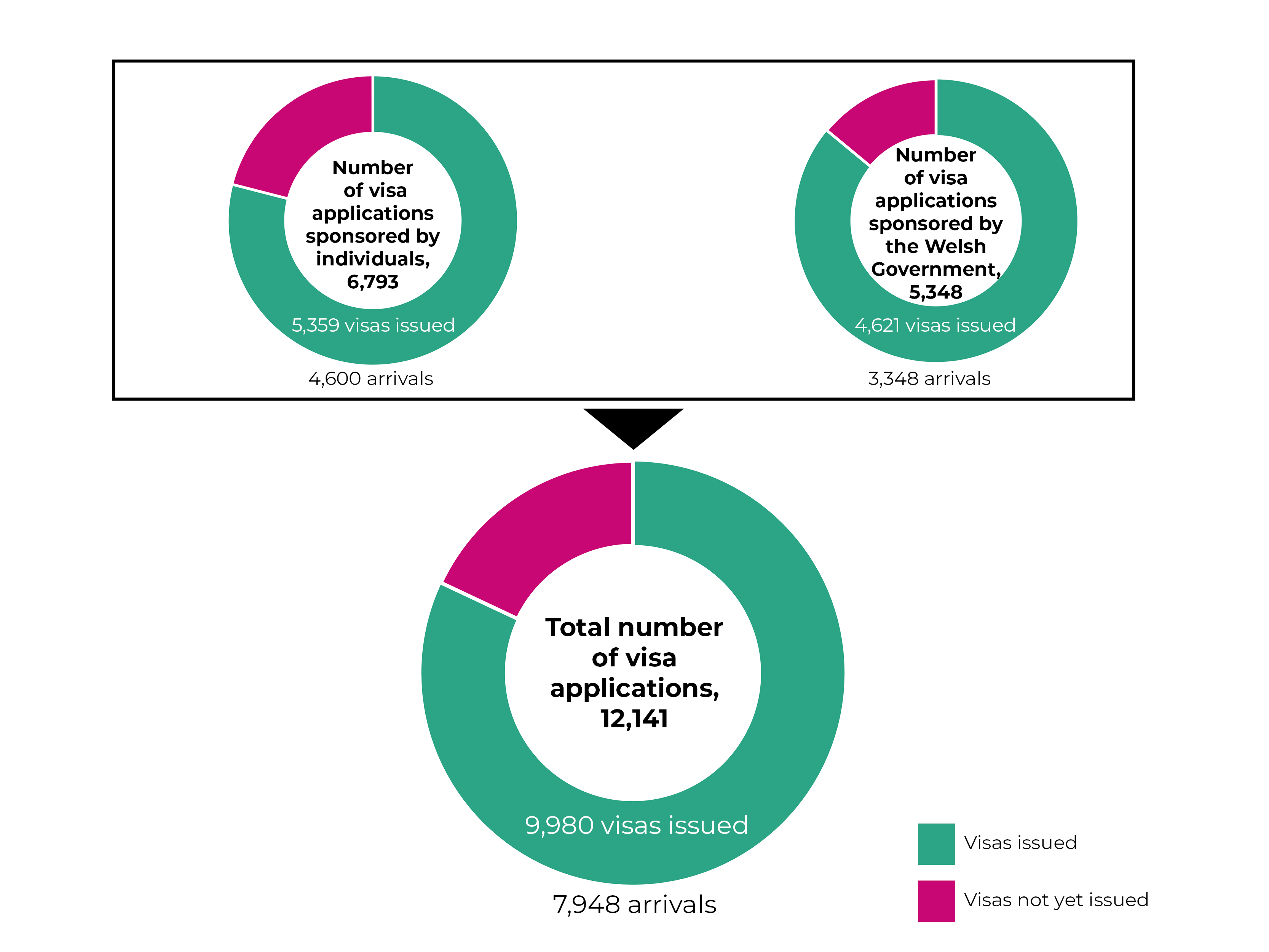
Source: UK Government
Number of visas issued and arrivals in Wales between April 2022 and November 2024
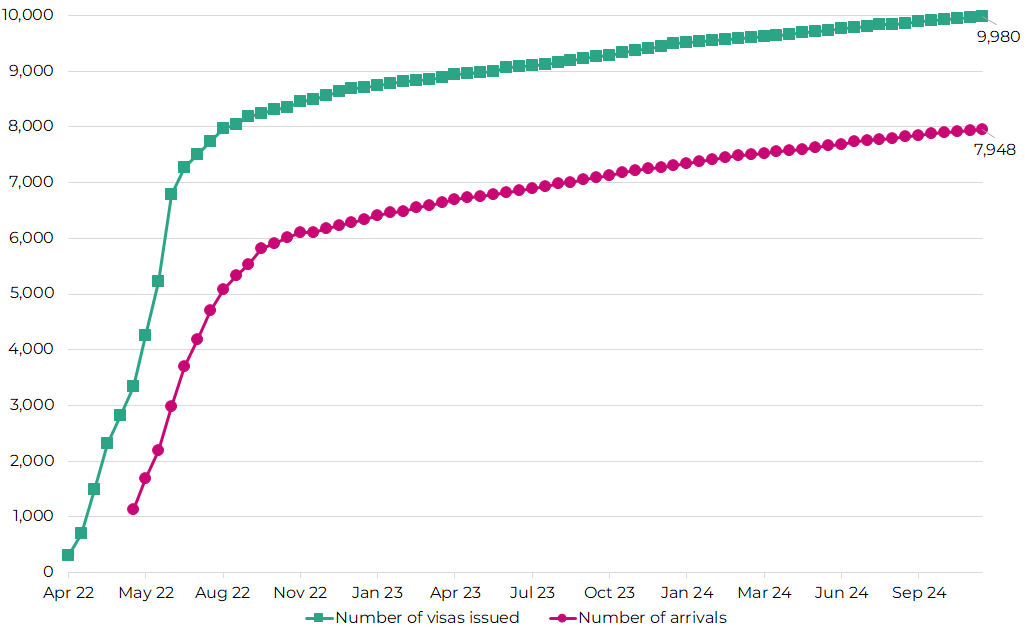
Source: UK Government
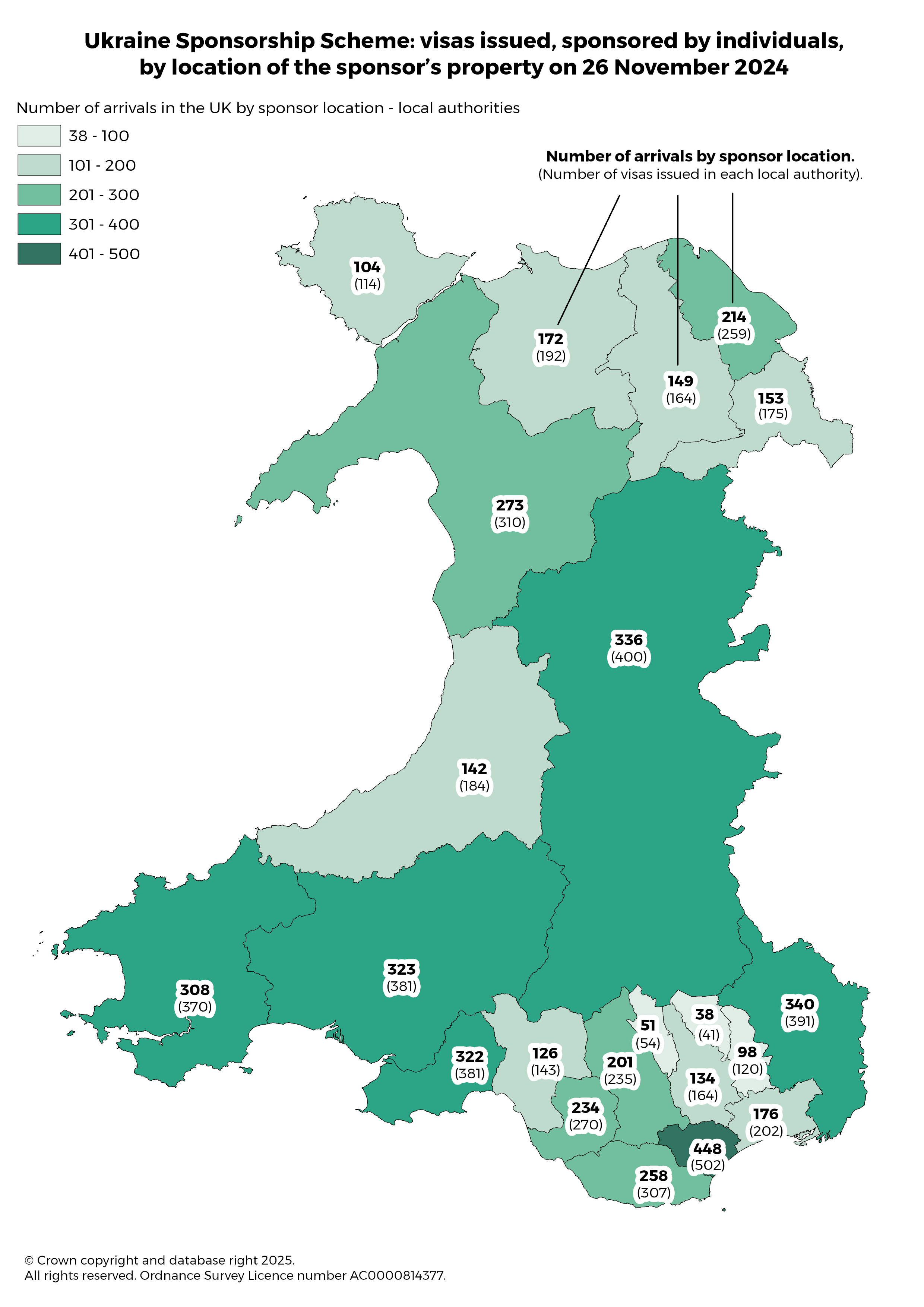
Audit Wales highlights pressures on public services
In March 2024, Audit Wales reported that the “Welsh Government has worked well with partners in difficult circumstances to accommodate and support Ukrainians”. Despite a positive appraisal of the overall approach, its report highlighted the pressures placed on public services.
|
Further detail on eligibility and application processes is available at Applying to the Ukraine Permission Extension scheme. |
Welsh trade with Ukraine and Russia
Wales’s trade with both countries continues at a reduced scale. Even though trade with Russia has dropped off more suddenly since the war began, Wales still trades more in value with Russia than it does with Ukraine.
Amongst Wales’s trading partners, Ukraine ranks 82nd for imports and 67th for exports. Russia ranks 86th for imports and 65th for exports.
Since 2020, Wales has exported more goods to Ukraine than it imports but imports have been most affected by the war.
The latest statistics, to the year ending September 2024, show that the value of trade with Ukraine dropped by 19.9% compared with the previous year, from £14.1m to £11.3m. This includes a 28% drop in the value of imports into Wales from Ukraine (from £2.5m to £1.8m) and an 18.8% drop in the value of exports from Wales to Ukraine (from £11.7m to £9.5m).
Wales’s top export to Ukraine by value was in machinery and transport equipment (£2.4m) and its top import from Ukraine was iron and steel (£0.5m).
The chart below shows Wales-Ukraine trade in goods over a ten-year period. Iron and steel imports account for increased import values between 2017-2019.
Wales-Ukraine trade by value (2013-2023)
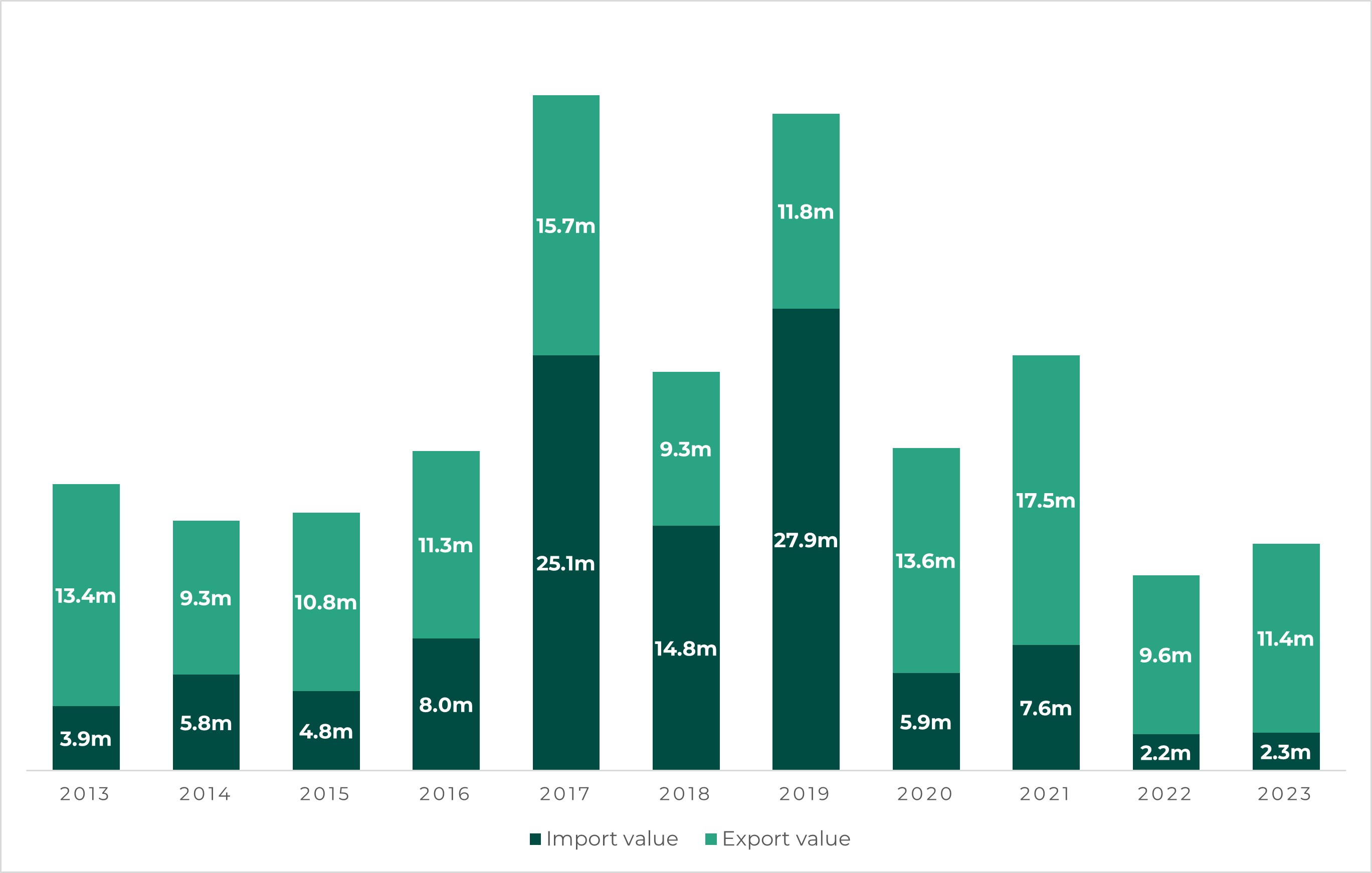
Source: Welsh Government, International goods trade: interactive dashboard
Between 2021 and 2022, goods trade value between Wales and Russia dropped by 58.7% to £191.5 million. This included a 55% drop in the value of Russian imports to Wales and a 70.5% drop in the value of exports from Wales to Russia.
The latest statistics, up to year ending September 2024, show continued sharp drop-offs in trade value of 31.2%, from £17m to £11.7m, compared to the previous period. This includes a drop in import values from Russia to Wales of 74% from £5 million to £1.3m and a drop in export values from Wales to Russia of 13.3%, from £12 million to £10.4m.
Wales’s top export by value to Russia was dairy products and birds’ eggs (£6.7m) and its top import from Russia was metals (£0.9m).
Wales-Russia trade by value (2013-2023)
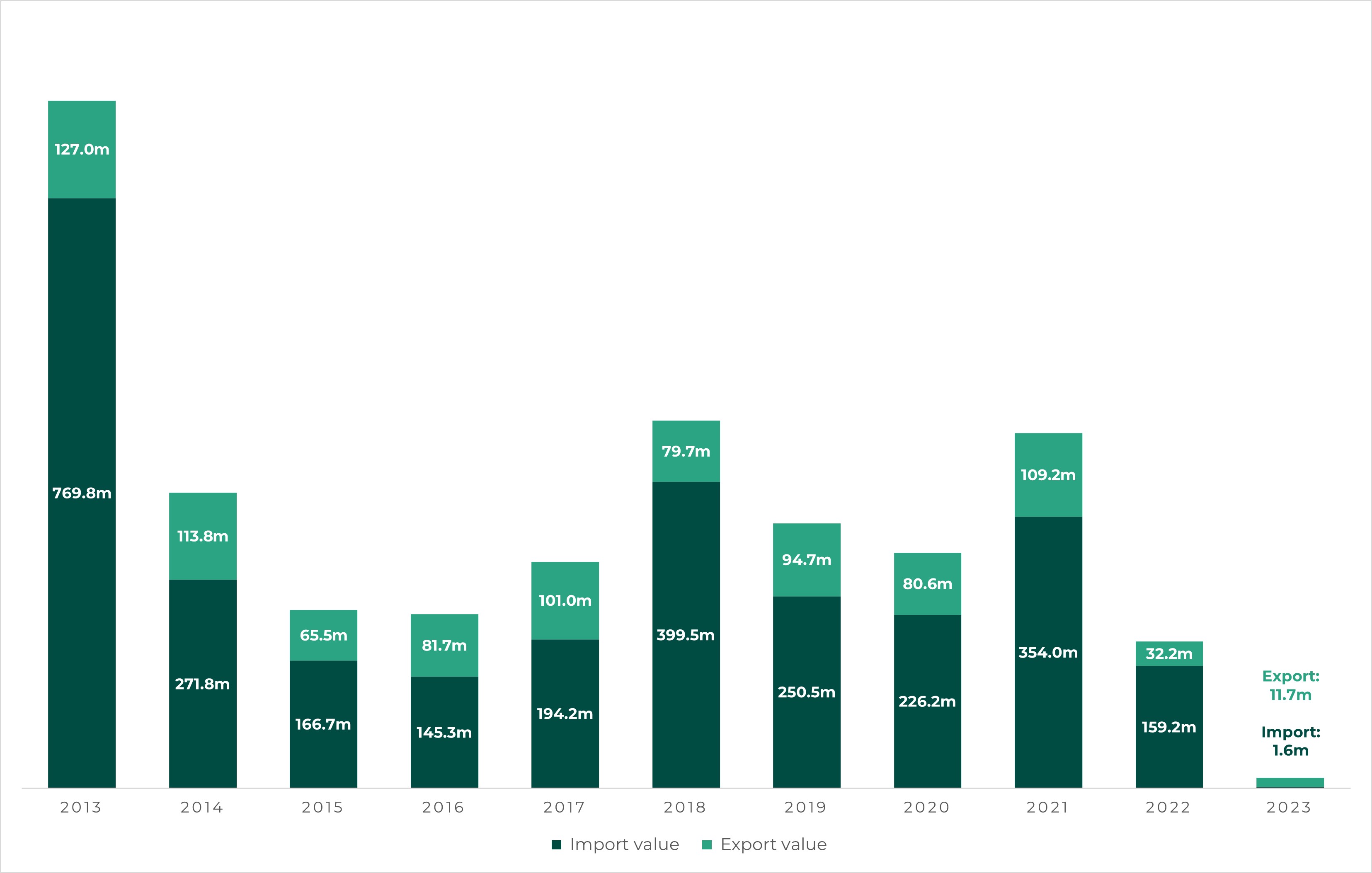
Source: Welsh Government, International goods trade: interactive dashboard
100-year partnership: a new dawn for UK-Ukraine relations
As part of its scrutiny of international agreements, the Legislation, Justice and Constitution Committee considered a new 100-year partnership between the UK and Ukraine. The Partnership Agreement was announced by the UK Government on 20 January 2025. The Cabinet Secretary for Social Justice, Jane Hutt MS, confirmed in Plenary on 11 February that the Welsh Government was consulted on the text.
Nine “pillars” of cooperation include defence and security, school and cultural exchanges, a Grain Verification Scheme, regular strategic dialogue between the governments, and more.
Secretary of State for Foreign, Commonwealth and Development Affairs, David Lammy MP, said that:
If Putin wins in Ukraine, the post-war order […] which has kept us all safe for more than eight decades, will be seriously undermined.
Foundational principles of sovereignty and territorial integrity will be shaken, and a more dangerous world will result.
That is why the Government will not falter […] and it is why we stand firmly with Ukraine, today, tomorrow, and for generations to come.
This week, the USA and Russia will meet in Saudi Arabia for talks about Ukraine’s future. European leaders will also meet for emergency talks in Paris. The Prime Minister has said he is “ready and willing to contribute to security guarantees to Ukraine by putting our own troops on the ground if necessary".
|
More information on UK support to Ukraine is available on the UK Government’s website. |
Article by Claire Thomas, Sara Moran and Maddy Phillips, Senedd Research, Welsh Parliament






